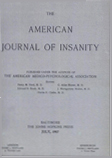CONTINUED FOLLOW-UP RESULTS IN INSULIN-SHOCK THERAPY AND IN CONTROL CASES
Abstract
This is a study of one hospital working out for itself answers to questions raised by the use of insulin-shock in schizophrenia.
At the Pennsylvania Hospital there have been immediate and important gains in one-half of all patients, and in two-thirds of acute cases (less than 18 months in duration).
After two years these gains remained in only one-fourth of all patients, but in one-half of the acute cases.
Control cases in the same hospital were found to show similar gains, two years from the time of admission, in one-sixth of all cases. These gains were without important relation to the previous duration of illness.
The experience of one hospital indicates that insulin-shock is a strikingly effective agent in schizophrenia. It also indicates a need for supportive measures to hold more firmly the gains that come quickly but which often tend to disappear.
Access content
To read the fulltext, please use one of the options below to sign in or purchase access.- Personal login
- Institutional Login
- Sign in via OpenAthens
- Register for access
-
Please login/register if you wish to pair your device and check access availability.
Not a subscriber?
PsychiatryOnline subscription options offer access to the DSM-5 library, books, journals, CME, and patient resources. This all-in-one virtual library provides psychiatrists and mental health professionals with key resources for diagnosis, treatment, research, and professional development.
Need more help? PsychiatryOnline Customer Service may be reached by emailing [email protected] or by calling 800-368-5777 (in the U.S.) or 703-907-7322 (outside the U.S.).



